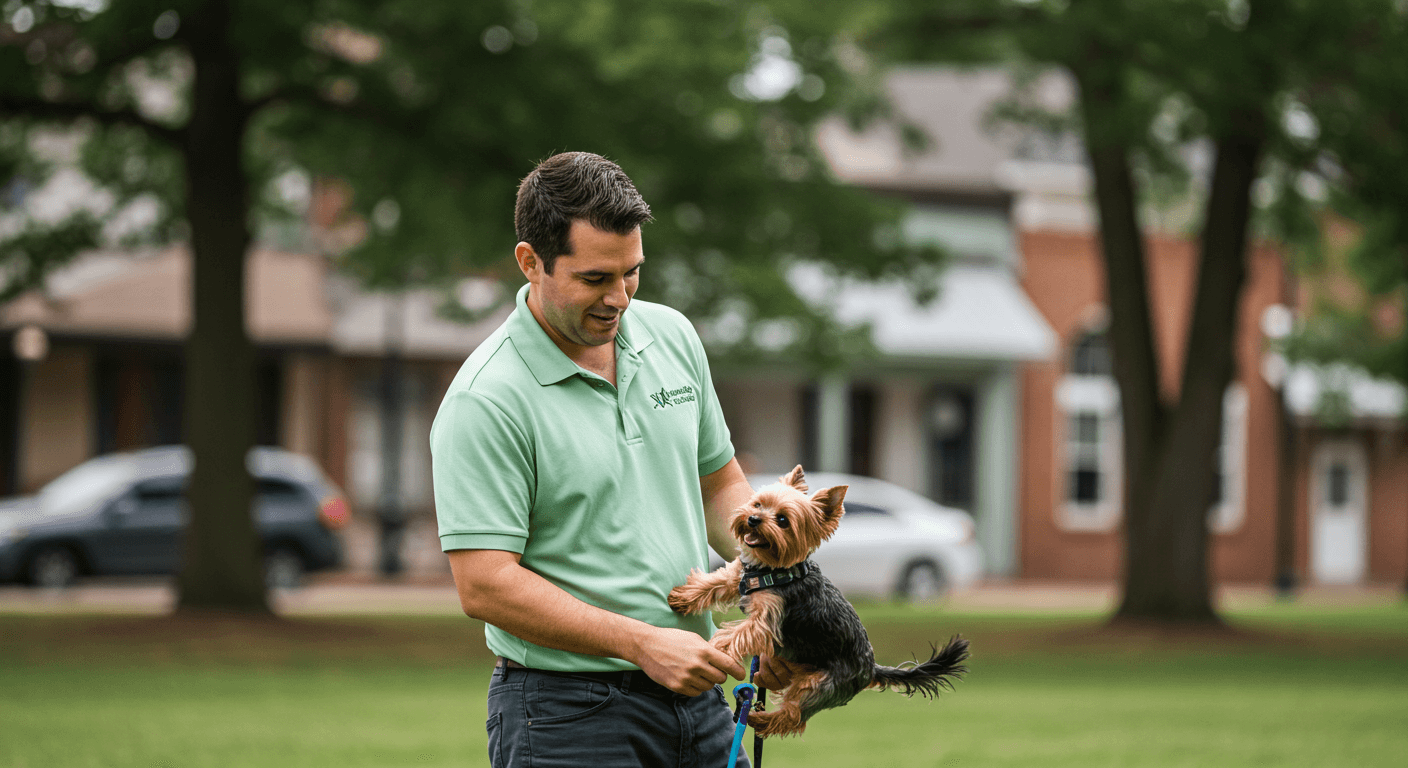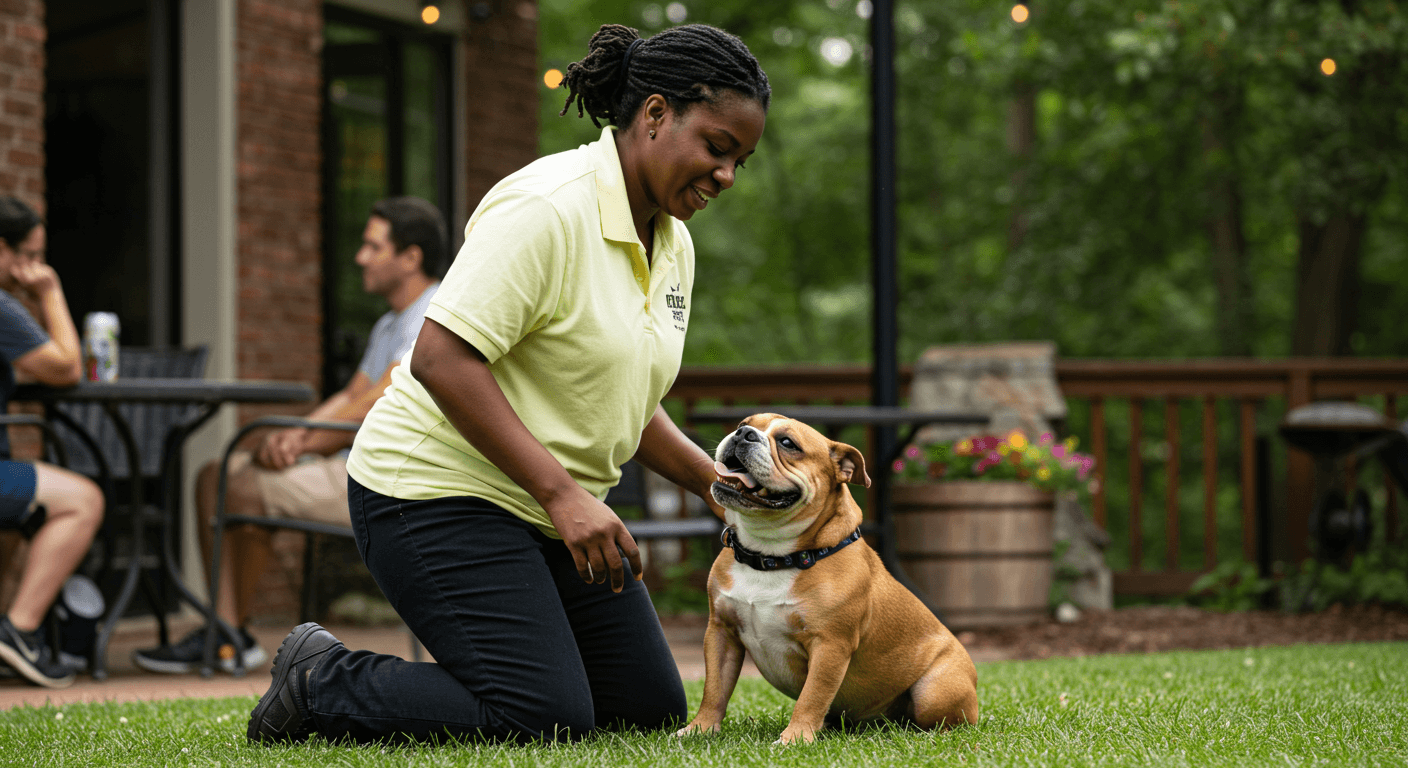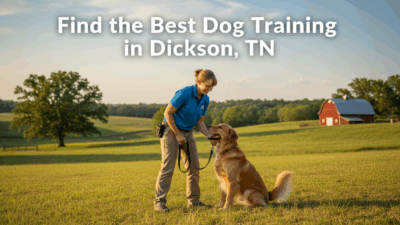Your Complete Guide to Choosing a Dog Trainer in Dickson TN and Surrounding Areas
Living with a dog in Dickson means navigating Main Street crowds during festivals, walking near the historic courthouse square, and maybe exploring local parks on weekends. Your dog needs to handle these situations calmly, whether you’re strolling through downtown or visiting family-friendly outdoor spaces around Dickson County.
Finding a trainer who understands small-town life in Middle Tennessee makes a big difference. Your dog’s training should prepare them for real life here, from polite encounters at local feed stores to staying focused during community events.
How to Choose the Right Trainer
Start by looking for someone who uses positive reinforcement training and understands the practical challenges of living in Dickson. Your dog should learn to walk calmly through town, stay polite when meeting neighbors, and handle trips to local businesses without causing drama.
Credentials help you compare trainers quickly and objectively. Common dog trainer certifications include KPA-CTP, CPDT-KA, or IAABC-CDBC for serious behavior issues. If your dog shows aggression or extreme fear, look for someone with CBCC-KA or a science-based program like CTC.
Private lessons work great for building foundation skills at home, addressing door manners, or practicing leash walking through your actual neighborhood. Group classes make sense once your dog can focus around other dogs, giving them practice with the distractions they’ll face in public.
Look for trainers who offer a free consultation or free evaluation before you commit. This gives you a chance to ask questions, see their methods in action, and make sure their personality fits your family.
Common Dog Training Methods Explained

Reward-based methods build the relationship you want while creating lasting behavior changes. They also help you follow local ordinances about keeping dogs under control without resorting to fear or pain.
Basic obedience covers sit, down, stay, place, recall, and leash training so your dog can handle downtown walks, restaurant patios, and park visits without pulling or jumping on people. These skills form the foundation for everything else.
Puppy training focuses on socialization, potty training, bite control, crate comfort, and early leash manners. Starting with short, positive training sessions prevents bad habits from forming in the first place and sets your puppy up for success.
Behavior modification addresses fear, reactivity, resource guarding, or separation anxiety through careful desensitization and counterconditioning. For serious cases, ask if your trainer works with local veterinarians who can rule out medical issues or prescribe anti-anxiety medication when needed.
In-home dog training lets you customize everything around your daily routines, while day training can speed up results when you’re short on time. Board and train programs work for intensive skill-building, but make sure the facility uses humane methods and includes thorough handoff sessions so you can maintain the progress.
Dog training classes help your dog practice good manners around other dogs and people. The best group classes give dogs plenty of space, screen participants carefully, and teach calm behavior rather than just excitement.
Specialized training like therapy dog training or service dog training requires extra structure, public-access skills, and a very clear step-by-step training program. Not every professional dog trainer offers these services, so ask about their experience with these specific goals.
Stay away from trainers who use fear, intimidation, or pain to get results. Humane methods are safer for everyone, easier to maintain long-term, and much better for keeping peace with your neighbors in close-knit communities like Dickson.
Average Cost of Dog Training in Dickson TN and Surrounding Areas (Updated for 2025)
Prices around Dickson and Dickson County depend on the trainer’s experience, how long sessions last, and where the training happens. Here’s what most local dog owners are paying in 2025.
| Service Type | Average Cost (Dickson/Dickson County) |
|---|---|
| Puppy classes (4-6 weeks) | $140-$260 total |
| Group obedience training (4-6 weeks) | $150-$280 total |
| Private lessons (60-90 min) | $100-$175 per session |
| In-home coaching packages (4-6 visits) | $400-$850 total |
| Day training (trainer works your dog) | $425-$900 per week |
| Behavior consult for reactivity/anxiety | $140-$225 |
| Board and train (2-4 weeks) | $1,900-$4,200 total |
You’ll probably pay extra travel fees for longer distances within Dickson County or nearby counties. Expect higher rates for complex behavior work or aggressive dog training that requires specialized skills.
Make sure you understand what’s included, how the trainer tracks progress, and whether they offer follow-up training sessions after your initial program ends.
Questions to Ask a Potential Dog Trainer
- What training methods do you use, and how do you keep training sessions positive and low-stress?
- What credentials do you have, like KPA-CTP or CPDT-KA? Do you keep up with continuing education such as CPDT-KSA?
- How will you customize the training program for my dog’s specific needs and our Dickson lifestyle?
- Do you offer in-home visits, dog training classes, or day training, and which approach fits my goals best?
- How will we measure my dog’s progress and know when to add more distractions?
- What are the total dog training services costs, including any travel fees, and what’s your cancellation policy?
- Do you carry liability insurance, and can you show me proof?
- For behavior problems, will you work with my veterinarian if needed?
- What should I practice between our sessions to help my dog keep improving?
Local Dickson Rules and Considerations
Dickson enforces leash laws and animal control regulations to keep neighborhoods and public spaces safe for everyone. Tennessee law also sets statewide health requirements for all dogs.
Leashes are required in all public spaces within Dickson city limits unless you’re inside a designated off-leash area. Keep a standard 6-foot leash with you for walks through downtown and visits to community events.
Tennessee law requires current rabies vaccination for all dogs over three months old. You can get these through Dickson County Animal Control, local veterinary clinics, or during periodic vaccination clinics. Your dog must wear their rabies tag on their collar whenever they’re in public.
Excessive barking can be considered a nuisance under local ordinances, so work with your trainer on alert barking and separation anxiety before neighbors start complaining. Good training can prevent these issues from escalating into formal complaints.
Tennessee doesn’t require special licenses for dog trainers, but if a trainer offers board and train services or kennels dogs for payment, their facility must be licensed by the Tennessee Department of Agriculture. You can verify kennel licenses through their Animal Care and Control program.
Dickson County Animal Control handles lost pets, licensing information, and other county resources. They’re located at 249 Henslee Drive and can answer questions about local animal regulations.
Local Dickson Resources for Dog Owners
These spots give you great places to practice polite manners, work on recall, and provide safe enrichment for your dog. Always follow the posted rules and etiquette guidelines.
- Dickson City Park offers open green spaces where you can practice leash skills and basic obedience on quieter days, though dogs must remain leashed at all times.
- Montgomery Bell State Park welcomes leashed dogs on most trails and offers excellent opportunities to build focus around wildlife, other hikers, and families. The park’s varied terrain helps you practice different scenarios.
- Henslee Park provides walking paths and open areas perfect for building a well-behaved dog’s manners around joggers, children, and other community members.

FAQs
How much does in-home dog training cost?
Most Dickson trainers charge $100-$175 per in-home visit, with discounts available when you buy packages. Behavior problems typically start at the higher end of that range because they require more expertise and careful planning.
Is in-home dog training worth it?
Absolutely, because you’re working on problems exactly where they happen. Your trainer can fix door manners, jumping on guests, counter-surfing, and yard reactivity right at home, then step outside to practice leash skills on your actual neighborhood sidewalks and help your dog generalize their training.
Can you pay someone to house train your dog?
Yes, many expert dog trainers offer puppy training programs that include potty training, crate routines, and daily schedules. Day training can speed up the process while teaching you how to maintain the progress at home.
What is the 3-3-3 rule for dog training?
This is a helpful timeline for new or adopted dogs: expect about 3 days for your dog to decompress, 3 weeks to learn your routines, and 3 months to feel completely settled. Good training programs work with this natural adjustment period rather than rushing things.
How long will it take to reach my training goals?
Most puppies and friendly adult dogs show solid progress within 4-8 weeks if you practice daily. Fear, reactivity, or aggression typically requires several months of careful behavior modification with gradual increases in difficulty and distractions.
What should I bring to group classes?
Pack a flat collar or harness, a 6-foot leash, high-value treats, water, and current vaccination records if your trainer requests them. Leave retractable leashes at home for safety reasons since they can tangle or cause injuries.
What’s the leash law in Dickson?
Dogs must be leashed and under control in all public areas within city limits. Tennessee state law also requires owners to keep their dogs under reasonable control at all times, which means a leash in most situations outside your property.
Do I need a dog license in Dickson or Dickson County?
Dickson County doesn’t require general pet licenses, but keep your dog’s rabies vaccination current and the tag on their collar. Contact Dickson County Animal Control at 615-789-4111 for specific questions about local requirements.
What shots does my dog need in Dickson County or Tennessee?
Rabies vaccination is required throughout Tennessee for all dogs over three months old. Your veterinarian may also recommend distemper-parvo, bordetella, and leptospirosis based on your dog’s lifestyle and exposure risks in Dickson County.
Are dog trainers required to be licensed in Dickson or Dickson County or Tennessee?
No special trainer licenses exist in Tennessee. Trainers follow normal business regulations, but if they offer board and train services or kennel dogs for payment, their facility must be licensed under Tennessee Department of Agriculture regulations for boarding kennels.
Where can I practice off-leash recall?
Your safest option is using a fenced yard or securely enclosed area. Dickson doesn’t currently have a dedicated fenced dog park, so consider traveling to nearby Nashville-area facilities if you need a public off-leash space for training for dogs.
Which dog parks allow training around Dickson and surrounding areas?
While Dickson doesn’t have a dedicated fenced dog park within city limits, you can find facilities in nearby counties. Always check current rules and hours before visiting, and choose quieter times for focused training sessions.
What trails allow dogs for training?
Montgomery Bell State Park welcomes leashed dogs on most trails and provides excellent opportunities for socialization and leash training around varied terrain, wildlife, and other park visitors. The natural setting helps you build a top dog who can handle outdoor distractions calmly.
How do I find a certified dog trainer in Dickson?
Look for trainers who list specific credentials on their websites or marketing materials. Common certifications include CPDT-KA, KPA-CTP, and IAABC-CDBC. Don’t hesitate to ask about their dog trainer certifications during your initial consultation.
What should I do if my dog has separation anxiety?
Work with a professional dog trainer experienced in behavior modification. Separation anxiety requires gradual desensitization, careful management of your departures and arrivals, and sometimes coordination with your veterinarian for medication support during the training process.
